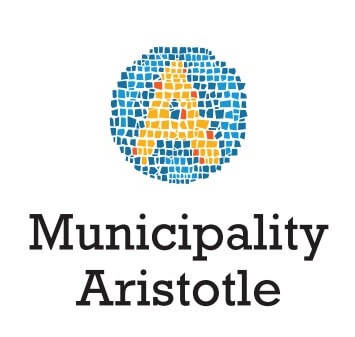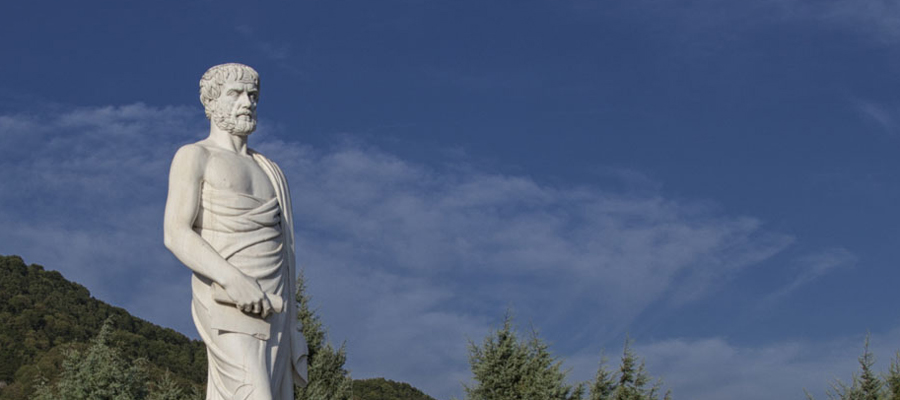The ideological foundation, then, of the democratic state is freedom; that is, they are accustomed to saying that only in this state do they participate in freedom; because this, they say, is what every democracy aims at. An element of freedom is to rule and rule by rotation, as democratic law imposes equality by number and not by value;
(Aristotle, Politics, book VI, 1317a-1317b. Translation: On Politics, Selected Texts of Ancient Greek Literature, Konstantinos I. Despotopoulos)
Aristotle was the embodiment of the right measure in all the manifestations of his life. He considered the virtue of moderation to be the supreme good, free from all excess and deficiency, which for him were the greatest vices. He understood the value of moderate enjoyment of material goods, a view that he had turned into a life attitude. His multilateral philosophical and scientific activity proves that he was endowed with a strong will and the ability to diagnose real situations.
He was a deeply emotional man, with innate kindness. He was characterized by the tenderness of his soul, his friendly devotion, love and special care for the members of his family and his friendly environment, as demonstrated by the text of his will preserved by Diogenes Laertius. Free from any arrogant behavior, he was distinguished for his philanthropy and his deeply humanitarian and benevolent disposition.
Text: Athena Marathianou/archaeologist
Aristotle, at the age of seventeen (367 BC), decided to leave Macedonia and try his luck in Athens, where he settled as a meticos. He became a member of Plato’s Academy and instead of becoming a doctor, like his father, he preferred to engage in philosophy and science. The Academy at that time ensured the best education in Greece and it is certain that Plato, and Platonic philosophy, had a decisive influence on his life and work. When Aristotle arrived in Athens, Plato was absent in Sicily. The great teacher often visited the court of Dionysius the Younger in Sicily, and tried to convince the tyrant to share his ideas. He stayed at the Academy for 20 full years (367-347 BC), until the death of his teacher, but there is no clear information about this period. Not much information has survived about the role he played in the Academy as a student and about his relations with his teacher. It is said, however, that he did not readily accept all of Plato’s theories. For a time he had certainly gained his favor, since Plato called him “reader” and “mind of the school”, but later, when their views diverged, serious differences emerged between them and there was probably tension in their relations. In fact, some people afterwards – most likely friends of Plato’s nephew and successor in the direction of the school, Speusippus – accused him of inappropriate behavior towards the teacher. In the second decade of his stay in Athens, he wrote some dialogues in the Platonic style and some of his important works concerning logic, the theory of language and rhetoric. There is also some information that he may have taught rhetoric himself. At the school Aristotle met Eudoxus of Cnidus, Heraclides of Pontus, and Xenocrates.
In 347 BC Plato dies and Aristotle leaves the Academy and Athens. Some scholars argue that his decision was influenced by the fact that Plato’s nephew, Speusippus, took over the direction of the school, with whose views neither he nor Xenocrates nor Theophrastus agreed. However, his departure may have also been related to politics, since the Athenians began to react to the expansionist policy of the Macedonians, and it was known that he himself had close ties to the Court of Philip II. Thus, after the invitation of Hermias, a former slave and student of the Academy and current tyrant of the cities of Atarna and Assos, he went to Assos in the Troas, in Asia Minor. Hermias had created around him a small circle of followers of Plato and the climate was favorable for Aristotle. He remained in Assos for three years and married Pythias, niece and stepdaughter of Hermias. With her he had a daughter, to whom he gave the same name. Later in Athens, after the death of his wife, he had a son, Nicomachus, with Herpyllidas who came from Stageira and had a permanent relationship with her. When Hermias was murdered by the Persians for his pro-Macedonian views, Aristotle left Asia Minor, and, at the urging of Theophrastus, his most loyal student and collaborator, settled in Mytilene (345 BC), where he remained for two years.
King Philip II had heard much about Aristotle from Hermias, and seeking a tutor for his son Alexander, later Alexander the Great, invited him to Pella. Thus, between 343 and 342 BC, Aristotle was in Macedonia, initially in Pella and then in the palace of the ancient city of Mieza, a few kilometers outside of present-day Naoussa. There he took on the education and training of Alexander, who was then thirteen years old. There is not much information about the period of his education. We do know, however, that Homer and the tragic poets were at the center of his teaching. During this period, the philosopher revised the text of the Iliad for his student, composed the works On the Kingdom and On the Colonies, and conceived the idea of his famous Republics. The respectful relations between the two men continued after Aristotle’s departure. After 340 BC, when Alexander was appointed regent, Aristotle settled in his birthplace, Stageira. In 339–338 BC, Speusippus died and Plato’s Academy was left without a head. Aristotle was among the candidates for the directorship, but he remained in Macedonia and did not go to Athens to submit his candidacy. Thus, Xenocrates was elected director of the school. This event was the main reason for the final rupture of Aristotle’s ties with the Academy and his departure.
In the area near the temple dedicated to the Lyceum of Apollo and the Muses, between the Lyceum Hill and the Ilissus River, he rented land (since according to Athenian law, as a foreigner he did not have the right to own property) and founded a school, the Lyceum. This school was called “Peripatos”, because its members discussed while walking in the gardens, and Aristotle’s followers were called “Peripatetics”. Aristotle took walks with his students every morning and discussed complex philosophical issues on logic, physics and metaphysics, topics that interested a limited number of people. In the afternoon or evening, he developed more understandable topics related to rhetoric, sophism and politics, in front of a wider audience.
The Lyceum differed significantly from Plato’s Academy, since it was more scientific than philosophical in nature. The students were mainly engaged in specialized scientific research under the guidance of their teacher. According to historical sources, his students “managed” the school for ten days each and dined together, while a symposium was also organized once a month. However, there is no further information about the work carried out at the school. During the 13 years that Aristotle directed the Lyceum (336/335-323/322 BC), he wrote important works on philosophy, ethics, biology and psychology. At the same time, he began organizing his research and classifying the sciences. He also collected hundreds of manuscripts and thus created the first large organized library that served as a model for the libraries of Alexandria and Pergamon. It is said that his old student, Alexander, helped him financially in this endeavor. After Aristotle’s departure, the school was headed by Theophrastus, who dealt, among other things, with physics and mainly with botany. During this time, the school flourished and the number of students increased – it is said that it reached 2,000 people.
After the death of Theophrastus, in 287 BC, the Lyceum was headed by Straton of Lampsacus (287-269 BC), Lycon (269-225 BC) and Critolaus (225-143 BC). The school then began to decline and was finally destroyed in 84 BC.
It is said that Aristotle was bald, with weak legs, small eyes, that he stuttered and that he took special care of his clothing. Also, that he could be terribly ironic and that he was quick to speak. His enemies presented him as effeminate and soft-spoken and argued that, unlike Plato, he did not have a good character. They said that he was lustful, foolish, agrarian, avaricious, ungrateful and a flatterer. They even spread the rumor that he participated in the murder of Alexander by poison. However, these characterizations – which scholars have overturned through valid information that exists about his biography as well as from what he himself says – most likely came from members of the schools of Speusippus and Isocrates, from Epicurus for reasons of jealousy, from followers of the anti-Macedonian faction who wanted to expel him from the city and from the Megarians, the followers of the Megarian school of Euclid, with whom he was in a bitter dispute. Moreover, there are numerous testimonies about the philosopher’s thoughts and kind character: The expressions in the Ethics of Nicomedia, the hymn to Hermias, his inscribed statue at Delphi, the elegy in honor of Eudemus and his relationship with Antipater, are some of them. But his will is also an additional proof of Aristotle’s personality. It proves to be a valuable source of information about his character and generally his relationships with the people around him, relatives, friends, freemen and slaves. From its text it can be deduced that he was a man who had felt the loneliness of life intensely and felt gratitude for all the people who contributed to alleviating, or even eliminating, this feeling. In his will, he asked to be buried next to his first wife, Pythias, who had already died.
For Erpyllida, who had taken care of him, his family and their household, he made sure that she was allowed to choose the best of his estates in Chalkis or Stageira and encouraged her to rebuild her life, if she wanted. He appointed his daughter to be married to Nicanor, the son of the Consul, his guardian. He also wished that the slaves who served him be protected and restored economically and socially. In particular, he provided for the slaves to be endowed and expressed his desire that they be married to people of general acceptance. For the children of his slaves, he asked that they “not be sold when they are born of age, but set free according to their value”, and he even saw to the immediate liberation of some.



